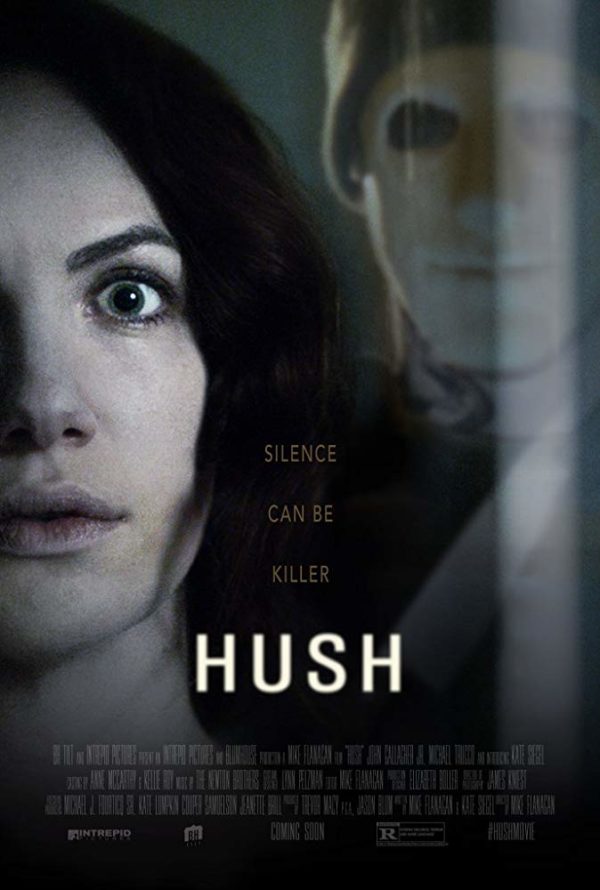
Horror films with small casts and a single location can be some of the best out there.
Hush definitely falls into this category. There are five actors. Only two of them have any appreciable screen time. There is only one location, the main character’s house (which, of course, is in the middle of nowhere).
With that bare bones load, the story still carries a solid amount of tension, interesting character bits, and a solidly disturbing atmosphere.
Even more impressive: there’s hardly any dialog. The main character is deaf and mute. The main antagonist doesn’t have much to say (and what he does say is kind of disturbing in a “I’ve seen people like this” sort of way).
Nothing is wasted in the storytelling. Everything has a place and it all plays into building the tension and the ultimate resolution. This is a nice tight piece of film making.
The Plot
Maddie (Kate Sigel) is an author living alone in a rural area. One night, after a disastrous cooking experiment and while agonizing over the final chapter of her second book, things take a turn and she finds herself trapped inside her own home by a killer (John Gallagher, Jr.) who takes great pleasure in tormenting his victims.
Oh, and she’s deaf and mute.
There’s really not much to this plot. The fact that it’s so lean means it’s all up to the two main actors, Sigel and Gallagher, to keep things interesting. They do a great job.
“I can come in any time I want.”
There have been a number of single setting horror and thriller films in the past. Some of them even have a cast as small or smaller than this one. A number of them are at least as effective in keeping the tension high and the situation interesting and believable.
There’s nothing supernatural going on here. No zombies no long-dormant evil forces. Just one guy who really wants to kill people (and, in one nice little quick reveal, we see he’s killed at least 13 over some indeterminate amount of time).
Having the lead character be deaf is nice to see. You’re more likely to get a blind lead character than a deaf one most of the time (when you get any character that’s missing a primary sense). The fact that Maddie is competent, in general, is great and it makes the tension of the overall situation even better.
She’s not some standard “victim”… she’s someone who’s made her way despite hardship thrust upon her by a disease when she was just a kid. She’s become successful and we know she’s more than happy to go her own way (yet still human and relateable enough to still be having issues really letting go of an ex).
There’s one gimmick in the film that I was worried was going to be overused. Early on, when she’s describing her writing process to a friend of hers, Maddie describes it as a voice in her head that runs through all the different possibilities. I was worried that was going to happen again, and again, and again as the film progressed. That wasn’t the case. In fact, I’d go as far to say that it was under used… because when it did finally come up, it almost felt out of place. It still worked, though, so I can’t really complain.
The driving tension–the predator stalking and toying with his prey–is very well done. Maddie gets plenty of chances to be clever and almost succeed. Sometimes he foils her, sometimes it’s just bad luck. That’s an important mix in a movie like this. If you have the predatory always be the reason an escape plan doesn’t work, you start to lose any realism. Having the prey’s own anxieties or shortcomings as the foil too often diminishes the vibrancy of your supposed hero, and undercuts the believability of any success they do have. Having it all just go poorly because of bad luck quickly descends into slapstick or supernatural shenanigans. Hush keeps just the right balance.
The fact that the house is full of ground-floor-level windows and doesn’t have a single solid outer door makes the taunt “I can come in any time I want” all the more chilling. Because, obviously, it’s true.
The Verdict
If you’re looking for a decently tense, tightly strung thriller, you’ve got one right here. It’s not over the top in any way. If any part of it were any less well-done, it would vanish into mediocrity.
As it is, it stands out for the choice of having a deaf main character (even if that character is played by a hearing actress) and a very “everyman” kind of villain. There’s not much that should turn people away from this film (the one bit that would have–and, man, did I think it was going to–is interrupted by the competence of the main character, making it a double-win).

Leave a Reply